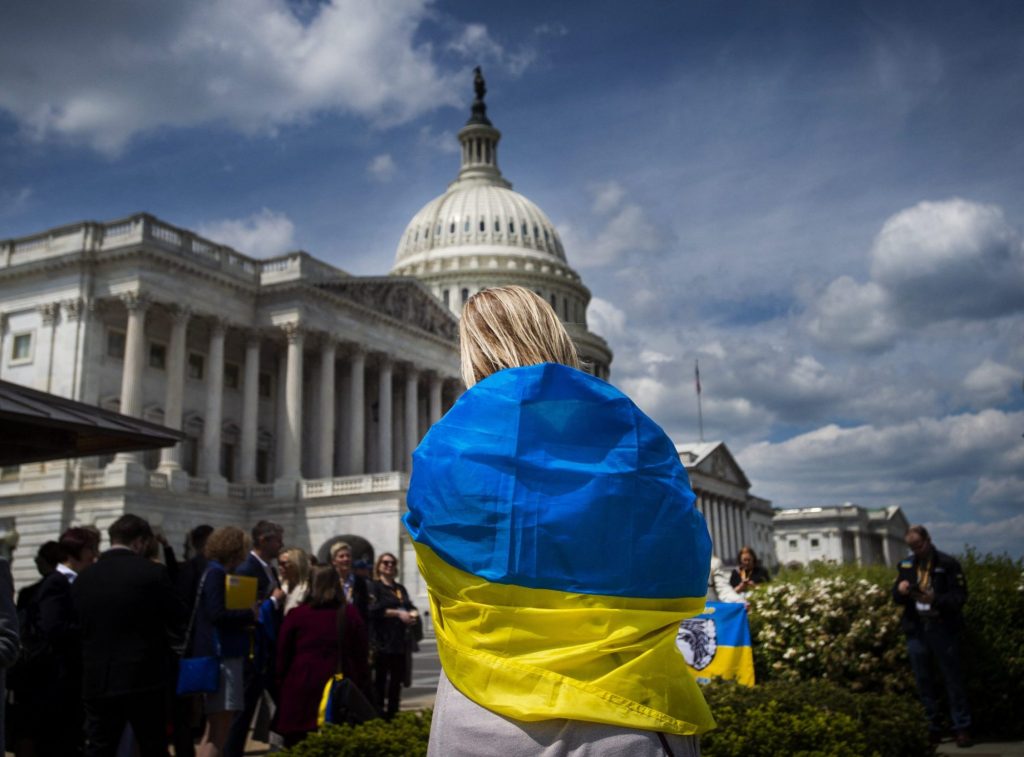Fifteen months into Russia’s full-scale invasion of Ukraine, the Biden administration has yet to resolve a central tension in its thinking about this war of aggression in the heart of Europe. Is the US aim to shape the future toward a rules-based order in which the sovereign independence of states is affirmed and accountability for crimes against humanity is strengthened? Or is the goal to sufficiently damage Russian power and legitimacy so that one of America’s principal rivals no longer serves as a distraction from the more dangerous long-term threat posed by China?
These goals are not mutually exclusive. Indeed, the Biden administration could argue that it has been pursuing both, and with some success. A Russia badly depleted by its own recklessness could restrain the Kremlin’s future ambitions while also serving as a cautionary tale for Chinese President Xi Jinping as he weighs his options on Taiwan.
At the same time, these objectives are not identical. Affirming the robustness of a rules-based international order requires that Russia decisively lose its war of aggression against Ukraine, relinquish illegally seized Ukrainian territory, and be held fully accountable for its crimes. It also requires that Ukraine is enabled, through Russian reparations, global assistance, and EU membership, to restore its economic and political capacity. This would entail sustained American military and economic support, along with a willingness to accept the risk of Russian escalation as the hoped-for Ukrainian victory nears.
Weakening Russia, to America’s strategic advantage, is a less ambitious goal. Russia has already been badly bruised. A sustained stalemate in Ukraine which further depletes Russian power would satisfy this objective. So would a compromise peace that left Russia in control of some Ukrainian lands and in a position to maintain a stranglehold on Ukraine’s economy while it recovers and awaits an opportune moment to resume all-out war. This would require continued but constrained US military support for Ukraine. It would entail less short-term risk than pursuing a decisive result in Ukraine, but would mean accepting that Russia could launch a new invasion at a later date.
Stay updated
As the world watches the Russian invasion of Ukraine unfold, UkraineAlert delivers the best Atlantic Council expert insight and analysis on Ukraine twice a week directly to your inbox.
Recent comments by US Undersecretary of Defense Colin Kahl illustrate the need for greater clarity on US policy toward the ongoing Russian invasion of Ukraine. Addressing the conflict, Kahl said the United States was “all in” with Ukraine, and also asserted that “Russian has already lost, by any measure.” These statements send out conflicting messages. Russia has not been defeated “by any measure,” unless we define defeat as a depletion of its power. That may be a worthy goal, but it is not Ukraine’s goal, which is the full restoration of sovereignty. Being “all in” with Ukraine would imply supporting the country’s complete de-occupation. However, Russia still controls almost 20% of Ukrainian territory.
Kahl might have said the US will not be satisfied until Russia leaves Ukraine and is held accountable for its crimes. We are accustomed to hearing as much from the US President and his Secretary of State. Instead, the Undersecretary of Defense risked creating the impression that the US would be satisfied with a fragile and transitory peace or an ongoing stalemate that continues to sap Russian strength without necessarily achieving a clear Ukrainian victory.
Eurasia Center events

Such mixed messaging could prove costly. It has the potential to reinforce Kremlin claims that the conflict in Ukraine is a US proxy war to weaken Russia rather than a struggle to defend the rules-based international order. It could also reinforce suspicions that the incrementalism of US arms supplies to Ukraine is designed to create a stalemate instead of winning the war.
Many in Kyiv would welcome greater clarity. Some Ukrainians are alarmed by the apparent lack of unity within the Biden administration over the US response to Russia’s invasion, and worry that their country’s survival is dependent on the vagaries of bureaucratic and partisan politics as President Biden enters an election year. They fear that the first serious Russian proposal for negotiations could place Ukraine on a slippery slope toward a new frozen conflict, followed by another Russian “special military operation” at a time of Moscow’s choosing.
The US has been instrumental in rallying international support for Ukraine over the past fifteen months, but the Biden administration still needs to clarify whether it views the Russian invasion as a pivotal moment in world politics. If not, it would make sense to mitigate risks, accept any gains, and move on. If the conflict is pivotal, the US should be prepared to accept the additional short-term risks associated with relaxing restraints on support for Ukraine, and should seek to craft an end game that discourages further aggression.
As Ukraine’s principle supporter, the US has the power to force a fragile peace or to prolong a stalemate until Russian power is deemed sufficiently depleted. But it also has the power, together with its allies and partners, to make better use of this crisis and shape the future in a far more positive direction.
Michael F. Oppenheimer is a professor at the Center for Global Affairs at New York University’s School for Professional Studies.
Further reading
The views expressed in UkraineAlert are solely those of the authors and do not necessarily reflect the views of the Atlantic Council, its staff, or its supporters.

The Eurasia Center’s mission is to enhance transatlantic cooperation in promoting stability, democratic values and prosperity in Eurasia, from Eastern Europe and Turkey in the West to the Caucasus, Russia and Central Asia in the East.
Follow us on social media
and support our work
Image: A woman wrapped in the Ukraine national flag prior to a Ukrainian Victory Resolution during a press conference a the US Capitol in Washington, DC. Tuesday, April 25, 2023. (Photo by Rod Lamkey/CNP/ABACAPRESS.COM)




